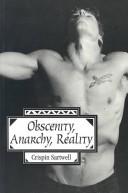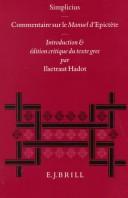| Listing 1 - 5 of 5 |
Sort by
|

ISBN: 0520916476 0585285098 9780520916470 9780585285092 0520201337 0520201329 Year: 1996 Publisher: [Place of publication not identified] University of California Press
Abstract | Keywords | Export | Availability | Bookmark
 Loading...
Loading...Choose an application
- Reference Manager
- EndNote
- RefWorks (Direct export to RefWorks)
Here is an original and provocative anthropological approach to the fundamental philosophical question of what makes life worth living. Gordon Mathews considers this perennial issue by examining nine pairs of similarly situated individuals in the United States and Japan. In the course of exploring how people from these two cultures find meaning in their daily lives, he illuminates a vast and intriguing range of ideas about work and love, religion, creativity, and self-realization.Mathews explores these topics by means of the Japanese term ikigai, "that which most makes one's life seem worth living." American English has no equivalent, but ikigai applies not only to Japanese lives but to American lives as well. Ikigai is what, day after day and year after year, each of us most essentially lives for.Through the life stories of those he interviews, Mathews analyzes the ways Japanese and American lives have been affected by social roles and cultural vocabularies. As we approach the end of the century, the author's investigation into how the inhabitants of the world's two largest economic superpowers make sense of their lives brings a vital new understanding to our skeptical age.
Social values --- Quality of life --- Conduct of life --- Social Conditions --- Sociology & Social History --- Social Sciences --- Ethics, Practical --- Morals --- Personal conduct --- Ethics --- Philosophical counseling --- Conduct of life.
Book
ISBN: 903343606X Year: 1996 Publisher: Leuven Acco
Abstract | Keywords | Export | Availability | Bookmark
 Loading...
Loading...Choose an application
- Reference Manager
- EndNote
- RefWorks (Direct export to RefWorks)
levenskunst --- Affective and dynamic functions --- Cognitive psychology. --- Conduct of life. --- Levenskunst --- Positief denken --- Levenskunst. --- Positief denken. --- Cognitive psychology --- Conduct of life --- Ethics, Practical --- Morals --- Personal conduct --- Ethics --- Philosophical counseling --- Psychology, Cognitive --- Cognitive science --- Psychology

ISBN: 0585036381 9780585036380 0791429075 0791429083 1438418736 Year: 1996 Publisher: Albany State University of New York Press
Abstract | Keywords | Export | Availability | Bookmark
 Loading...
Loading...Choose an application
- Reference Manager
- EndNote
- RefWorks (Direct export to RefWorks)
Conduct of life. --- Conduct of life --- Philosophy --- Philosophy & Religion --- Ethics --- Ethics, Practical --- Morals --- Personal conduct --- Philosophical counseling --- Sartwell, Crispin, --- Philosophical anthropology --- Paraphilias --- Anarchism --- Morale pratique --- Anthropologie philosophique --- Perversion --- Anarchisme --- Morale
Book
ISBN: 2213597332 9782213597331 Year: 1996 Publisher: Paris Fayard
Abstract | Keywords | Export | Availability | Bookmark
 Loading...
Loading...Choose an application
- Reference Manager
- EndNote
- RefWorks (Direct export to RefWorks)
Spiritual life. --- Labyrinths --- Conduct of life. --- Vie spirituelle --- Labyrinthes --- Morale pratique --- Psychological aspects. --- Aspect psychologique --- Histoire --- Labyrinthe --- Mythologie --- Religion --- Religious aspects --- Psychology. --- Conduct of life --- Spiritual life --- #GGSB: Symbolen --- Life, Spiritual --- Religious life --- Spirituality --- Ethics, Practical --- Morals --- Personal conduct --- Ethics --- Philosophical counseling --- Mazes --- Psychological aspects --- Religious aspects&delete& --- Psychology --- History --- French literature --- Symbolen --- Labyrinths - Religious aspects - Psychology. --- Labyrinths - Psychological aspects. --- LABYRINTHES --- ASPECT SYMBOLIQUE

ISBN: 9004097724 9004320881 9789004097728 Year: 1996 Volume: 66 Publisher: Leiden : Brill,
Abstract | Keywords | Export | Availability | Bookmark
 Loading...
Loading...Choose an application
- Reference Manager
- EndNote
- RefWorks (Direct export to RefWorks)
The significance of Simplicius' commentary lies in the fact that it is a Neoplatonist interpretation of a Stoic text. This volume presents the first critical edition based on all the known manuscripts of this work and offers, in contrast to the edition of Schweighäuser (1800) and the recapitulation of this edition by Dübner (1840), a text which is more complete and improved. A long introduction places the work in the philosophical and historical context of its time and characterises it as a spiritual exercise. The edition is preceded by a summary of the history of the text.
Ethics --- Conduct of life --- Morale --- Morale pratique --- Early works to 1800 --- Ouvrages avant 1800 --- Epictetus --- Ethics, Ancient. --- -Ethics, Ancient --- Ancient ethics --- Ethics, Practical --- Morals --- Personal conduct --- Philosophical counseling --- Ėpiktet --- Epiktit --- Epitteto --- Epiktétos --- Epictète --- Epicteto --- Ἐπίκτητος --- Early works to 1800. --- Epiktetos --- Epiktet --- Ethics, Ancient --- Epictetus. --- Conduct of life. --- Manual (Epictetus) --- Enchiridion (Epictetus) --- Encheiridion (Epictetus) --- Conduct of life - Early works to 1800.
| Listing 1 - 5 of 5 |
Sort by
|

 Search
Search Feedback
Feedback About UniCat
About UniCat  Help
Help News
News